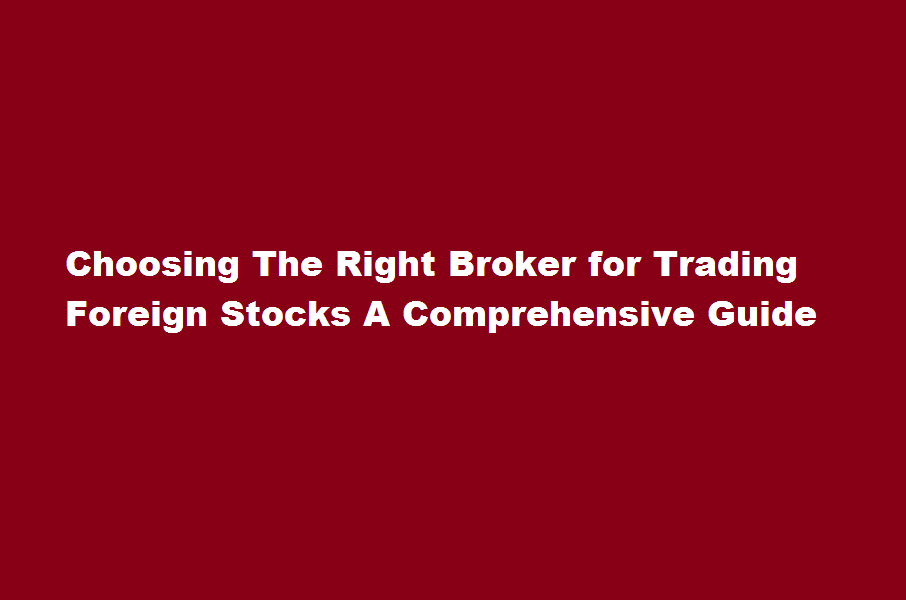Choosing The Right Broker for Trading Foreign Stocks A Comprehensive Guide
4 min read
Introduction
Trading foreign stocks requires a reliable and suitable broker that caters to your specific needs. Selecting the right broker is crucial for executing trades efficiently, accessing international markets, and obtaining essential research and analysis tools. This article provides a comprehensive guide on how to choose the right broker for trading foreign stocks, covering key factors such as fees and commissions, trading platforms, research tools, customer support, and regulatory considerations.
Fees and Commissions
- Trading Costs Compare the brokerage’s commission fees for trading foreign stocks. Look for competitive pricing structures that offer reasonable rates for international trades.
- Currency Conversion Fees Consider the fees associated with currency conversions when trading foreign stocks. Some brokers may charge additional fees for converting currencies, which can impact overall trading costs.
- Account Maintenance Fees Check if the broker charges any account maintenance or inactivity fees. Ensure that the fees are reasonable and align with your trading frequency and investment strategy.
Trading Platforms
- International Market Access Ensure that the broker provides access to the international markets where you plan to trade foreign stocks. Look for a wide range of available exchanges and countries.
- User-Friendly Interface Evaluate the trading platform’s usability and interface. It should be intuitive, reliable, and provide efficient order execution for seamless trading experiences.
- Advanced Tools and Features Assess the availability of advanced trading tools such as real-time market data, charting capabilities, order types, and customizable dashboards. These features can enhance your trading analysis and decision-making process.
Research and Analysis Tools
- Company Information Check if the broker offers comprehensive company information, financial statements, analyst reports, and research tools for foreign stocks. Having access to reliable research resources can assist in making informed investment decisions.
- Economic Data Look for brokers that provide economic indicators, country-specific data, and market news relevant to the foreign countries where you plan to trade stocks. Access to such data can help you assess the macroeconomic environment and its impact on stock performance.
- Third-Party Research Evaluate whether the broker provides access to third-party research reports, ratings, and insights on foreign stocks. Third-party research can offer alternative perspectives and valuable information for your investment analysis.
Customer Support
- Responsiveness Consider the quality and responsiveness of the broker’s customer support. They should be accessible and prompt in addressing your inquiries, technical issues, or account-related concerns.
- Multilingual Support If you require assistance in a specific language, ensure that the broker offers multilingual support to cater to your needs effectively.
- Educational Resources Look for brokers that provide educational resources such as tutorials, webinars, or articles on trading foreign stocks. These resources can help enhance your knowledge and skills in international trading.
Regulatory Considerations
- Licenses and Regulations Verify that the broker is regulated by a reputable financial authority. Check if they hold licenses to operate in the countries where they offer foreign stock trading services. Regulatory oversight provides a level of security and protection for investors.
- Investor Protection Assess the broker’s investor protection measures, such as membership in investor compensation schemes or segregated client accounts. These safeguards can provide additional peace of mind regarding the safety of your funds and assets.
Frequently Asked Questions
Can I trade foreign stocks with any brokerage account?
Not all brokerages offer access to international markets. Ensure that the brokerage you choose explicitly supports trading foreign stocks and provides access to the exchanges and countries you are interested in.
What is the typical commission structure for trading foreign stocks?
Commission structures vary among brokers. Some may charge a fixed fee per trade, while others use a percentage-based commission. It’s important to compare and evaluate the commission fees along with other factors when choosing a broker.
Can I test a broker’s trading platform before opening an account?
Many brokers offer demo accounts or trial periods that allow you to test their trading platforms and features before committing real funds. Take advantage of these opportunities to ensure the platform meets your requirements.
How important is customer support when choosing a broker?
Reliable customer support is crucial, especially when trading foreign stocks. Prompt and helpful customer support can assist you in navigating any issues, resolving queries, or obtaining timely assistance during international trading hours.
Are there any regulatory bodies that oversee international stock trading?
Yes, various regulatory bodies oversee international stock trading, depending on the country and the broker’s location. Examples include the Securities and Exchange Commission (SEC) in the United States, the Financial Conduct Authority (FCA) in the United Kingdom, and the Australian Securities and Investments Commission (ASIC) in Australia.
Conclusion
Choosing the right broker for trading foreign stocks is essential for successful international investments. Consider factors such as fees and commissions, trading platforms, research tools, customer support, and regulatory considerations when evaluating potential brokers. By conducting thorough research, comparing offerings, and assessing your individual trading needs, you can find a broker that aligns with your requirements and helps you execute trades in the global stock markets efficiently and effectively.
Read Also : Assessing Risks in Foreign Stock Investments A Comprehensive Guide






